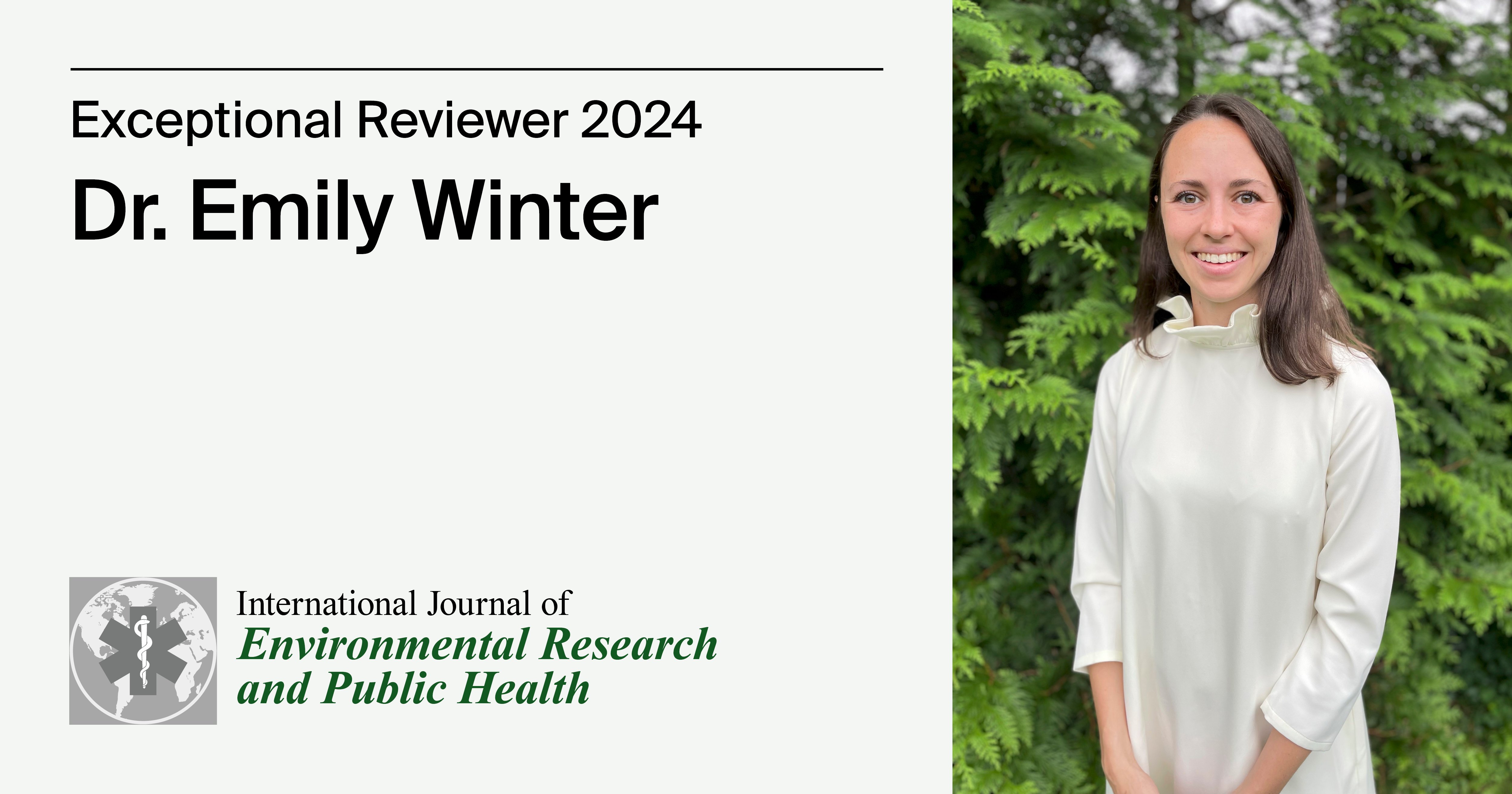
Journal Menu
► ▼ Journal Menu-
- IJERPH Home
- Aims & Scope
- Editorial Board
- Reviewer Board
- Topical Advisory Panel
- Instructions for Authors
- Special Issues
- Topics
- Sections & Collections
- Article Processing Charge
- Indexing & Archiving
- Editor’s Choice Articles
- Most Cited & Viewed
- Journal Statistics
- Journal History
- Journal Awards
- Society Collaborations
- Editorial Office
Journal Browser
► ▼ Journal Browser-
arrow_forward_ios
Forthcoming issue
arrow_forward_ios Current issue - Vol. 22 (2025)
- Vol. 21 (2024)
- Vol. 20 (2023)
- Vol. 19 (2022)
- Vol. 18 (2021)
- Vol. 17 (2020)
- Vol. 16 (2019)
- Vol. 15 (2018)
- Vol. 14 (2017)
- Vol. 13 (2016)
- Vol. 12 (2015)
- Vol. 11 (2014)
- Vol. 10 (2013)
- Vol. 9 (2012)
- Vol. 8 (2011)
- Vol. 7 (2010)
- Vol. 6 (2009)
- Vol. 5 (2008)
- Vol. 4 (2007)
- Vol. 3 (2006)
- Vol. 2 (2005)
- Vol. 1 (2004)
Need Help?
Announcements
12 May 2025
Interview with Dr. Emily Winter—International Journal of Environmental Research and Public Health Exceptional Reviewer 2024

Name: Dr. Emily Winter
Affiliation: School of Health Sciences, Touro University, 3 Times Square, New York, NY 10036, USA
Interests: health policy; environmental policy; cumulative risk; community-based environmental assessment; policy design
Dr. Emily Winter is an assistant professor at the School of Health Sciences, Touro University. In the fourth quarter of 2024, Dr. Winter was selected for the IJERPH Exceptional Reviewer List. We were honored to have an online interview with her on 17 April 2025 to talk about the review experience.
Below is the full interview with Dr. Emily Winter:
- Could you give us a brief introduction about yourself and your current research topic to our readers?
My name is Emily Winter. I am a licensed psychologist, certified school psychologist, and assistant professor at Touro University. My current research interests that I have recently published with MDPI center on a couple of topics. The first being intelligence and cognitive functioning, specifically infant and toddler cognitive functioning and developmental functioning. Secondly, and more recently, I have been working on some projects on aging and the cognitive aging process as well as the Flynn effect looking at the release of the new Wechsler Adult Intelligence Scale, Fifth Edition. I also do some work on mind–body–health as well as eating disorder intervention in schools.
- As a reviewer, what are the three most important criteria for you to evaluate a paper (e.g., innovation, methodological rigor, academic ethics, etc.)?
A comprehensive review and understanding of the literature, especially having an updated perspective and nuanced understandings of the literature. Being able to weave in different opinions and updated sources is important. Good methodology is also something I look at, especially in the era of open science and the replication crisis. Really good methodology and adhering to best practices with confidence intervals, effect sizes, and the language that people use to talk about their findings are all important. The last important thing that I look at, especially as a clinician, is practical impact. What do these findings mean for children, youth, and families or the general public? And how can clinicians and practitioners or even people, in general, use information to implement into their everyday lives?
- How do you view the potential impact of “open peer review” (public reviewer identity and review opinions) on academic communication?
Something that is important to me in being a peer reviewer is feedback. Honest and clear, but kind, feedback. The purpose of feedback is to make aspects of the paper better and to make manuscripts the best they can possibly be, so they can have the most impact on our communities. Kindness, resourcefulness—that is something that is super important to me. Keeping the review open theoretically leads to honest, actionable, and kind feedback. Also, other people could benefit from the feedback and seeing the revision process, how it went, especially if you are writing a similar paper.
- Based on your review experience, which non-technical factors (such as paper structure, figure presentation, and depth of literature review) are most likely to affect the quality of the manuscript?
Literature review depth. Entering a project really understanding where the gaps are, understanding how your research team’s perspectives can fill those gaps, is really, really important. And being up to date with the most current findings too.
- In the process of reviewing papers on the same topic multiple times, have you summarized potential opportunities or limitations in this topic? How do these observations affect the further direction of your current research?
Yes, in that I like seeing how other people approach and talk about topics and getting to see various versions of the paper. You get to see how people make changes and how people respond to comments. As somebody like me, a scholar, who is going through the peer review process as an author too, it gives me a nice insight into things I never thought to include. It lets me include topics and ideas in my future writing. Or, when I get a comment like this myself, how can I effectively respond to it? I think the reviewing process is like this cyclical, synergistic process of your giving back to the field and your colleagues, and you are also learning a lot about a topic which then, in turn, makes you a better scholar. It is hand in hand.



